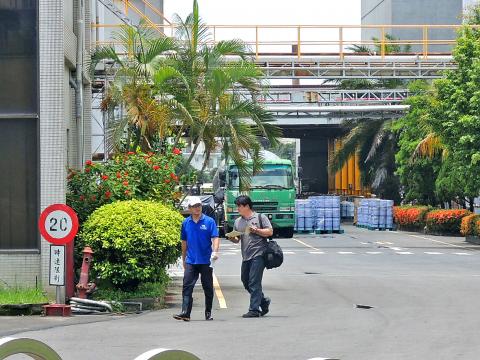Cheng I Food Co (正義食品) was yesterday ordered to pay NT$9.36 million (US$288,524) in compensation to more than 3,000 people after a class-action lawsuit filed by the Consumer Protection Association of Taiwan in a tainted cooking oil case from 2014.
The association said the decision by the Kaohsiung District Court fell short of the public’s expectations, as the case was filed on behalf of more than 5,000 people, who requested NT$90,000 each for a total of NT$478.35 million.
“We are disappointed by the ruling and the court did not take into account the damage to consumers’ health, so we will certainly appeal,” association officials said.

Photo: Tsai Ching-hua, Taipei Times
The decision was the first ruling on the case and it can be appealed.
The ruling requires the company to pay less than 2 percent of the total compensation sought through the lawsuit against Cheng I Food, a subsidiary of Ting Hsin International Group (頂新國際集團).
Cheng I Food allegedly mixed low-grade animal feed oil with cooking oil and sold it for human consumption with packaging and marketing efforts to make it appear to be high-grade cooking oil.
Investigators said that Cheng I Food purchased animal feed oil from Hsin Hao Corp (鑫好企業), a one-man operation based in Kaohsiung, whose proprietor, Wu Jung-ho (吳容合), was a sales representative for Cheng I Food until he resigned in 2004.
Wu has been charged with fraud and breaching the Act Governing Food Safety and Sanitation (食品安全衛生管理法).
Presiding Judge Shih Po-hung (施柏宏) said Cheng I Food was not aware of the source of the products it purchased from the suppliers and therefore the company was also a victim in the case.
Shih said the compensation figure was based on the cooking oil’s use to prepare meals at 23 schools with a total of 3,123 students at NT$3,000 per student.
Cheng I Food yesterday released a statement saying that the company respects the rights of consumers and fully understands the importance of food safety.
It added that in February, the court had found the company not guilty of criminal practices in a related case.
The statement said that the court had agreed with the company’s stance in the just-concluded case that it was not attempting to defraud its customers, but that the “company was deceived by our supplier” and the “supplier sold questionable oil to our company and we were not aware of the situation.”

DAREDEVIL: Honnold said it had always been a dream of his to climb Taipei 101, while a Netflix producer said the skyscraper was ‘a real icon of this country’ US climber Alex Honnold yesterday took on Taiwan’s tallest building, becoming the first person to scale Taipei 101 without a rope, harness or safety net. Hundreds of spectators gathered at the base of the 101-story skyscraper to watch Honnold, 40, embark on his daredevil feat, which was also broadcast live on Netflix. Dressed in a red T-shirt and yellow custom-made climbing shoes, Honnold swiftly moved up the southeast face of the glass and steel building. At one point, he stepped onto a platform midway up to wave down at fans and onlookers who were taking photos. People watching from inside

A Vietnamese migrant worker yesterday won NT$12 million (US$379,627) on a Lunar New Year scratch card in Kaohsiung as part of Taiwan Lottery Co’s (台灣彩券) “NT$12 Million Grand Fortune” (1200萬大吉利) game. The man was the first top-prize winner of the new game launched on Jan. 6 to mark the Lunar New Year. Three Vietnamese migrant workers visited a Taiwan Lottery shop on Xinyue Street in Kaohsiung’s Gangshan District (崗山), a store representative said. The player bought multiple tickets and, after winning nothing, held the final lottery ticket in one hand and rubbed the store’s statue of the Maitreya Buddha’s belly with the other,

‘NATO-PLUS’: ‘Our strategic partners in the Indo-Pacific are facing increasing aggression by the Chinese Communist Party,’ US Representative Rob Wittman said The US House of Representatives on Monday released its version of the Consolidated Appropriations Act, which includes US$1.15 billion to support security cooperation with Taiwan. The omnibus act, covering US$1.2 trillion of spending, allocates US$1 billion for the Taiwan Security Cooperation Initiative, as well as US$150 million for the replacement of defense articles and reimbursement of defense services provided to Taiwan. The fund allocations were based on the US National Defense Authorization Act for fiscal 2026 that was passed by the US Congress last month and authorized up to US$1 billion to the US Defense Security Cooperation Agency in support of the

HIGH-TECH DEAL: Chipmakers that expand in the US would be able to import up to 2.5 times their new capacity with no extra tariffs during an approved construction period Taiwan aims to build a “democratic” high-tech supply chain with the US and form a strategic artificial intelligence (AI) partnership under the new tariffs deal it sealed with Washington last week, Taipei’s top negotiator in the talks said yesterday. US President Donald Trump has pushed Taiwan, a major producer of semiconductors which runs a large trade surplus with the US, to invest more in the US, specifically in chips that power AI. Under the terms of the long-negotiated deal, chipmakers such as Taiwan Semiconductor Manufacturing Co (TSMC, 台積電) that expand US production would incur a lower tariff on semiconductors or related manufacturing